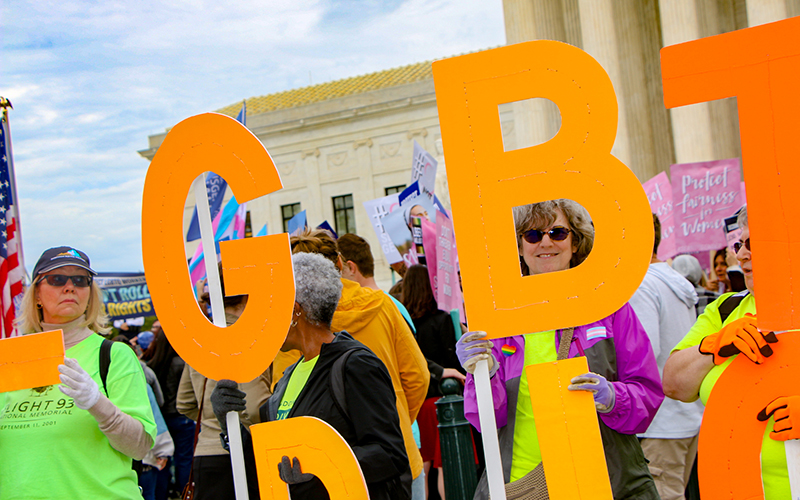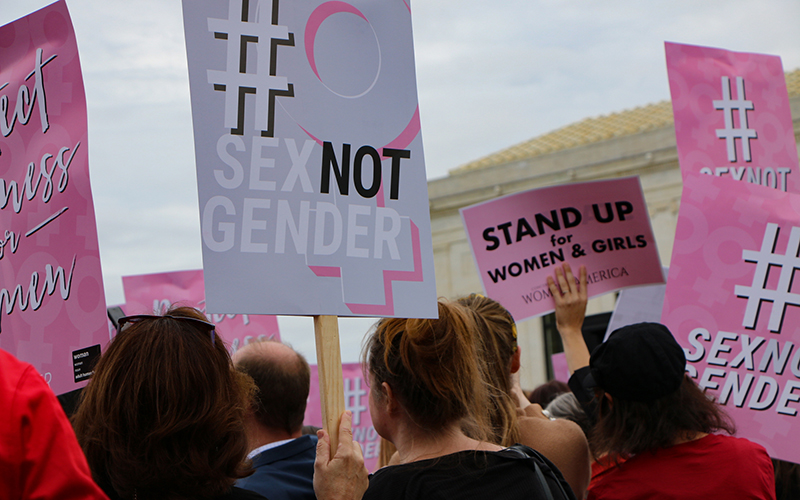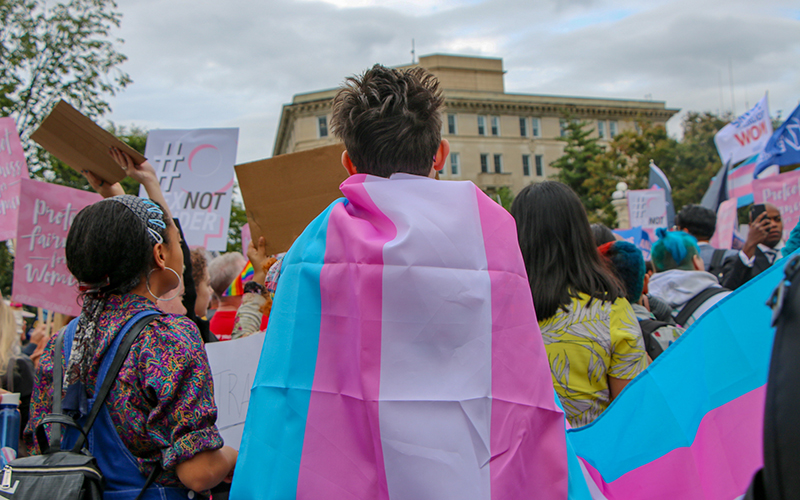
Advocates rallied outside the Supreme Court in October, as justices considered whether protections against workplace “sex discrimination” covered LGBTQ workers. The court ruled Monday that they do. (By Amy-Xiaoshi DePaola)

Opponents who rallied outside the court said that Congress never considered extending workplace protections to LGBTQ workers in the Civil Rights Act, and they charged that doing so now could backfire on women. (By Amy-Xiaoshi DePaola)
PHOENIX – The Supreme Court ruled Monday that the Civil Rights Act protections against “sex discrimination” also protect gay or transgender employees from discrimination, even if they are not specifically mentioned in the 1964 law.
The long-awaited ruling involved three separate cases of workers who were fired, two because they were gay and one who was hired as a male but fired after telling the company “she planned to ‘live and work full-time as a woman.'”
Advocates in Arizona like Angela Hughey, executive director of One Community in Phoenix, hailed the 6-3 decision as “an important step forward for equality.”
“But it is also a powerful reminder of how much work is left to do to ensure gay and transgender Arizonans have equal protections in all facets of life including housing, healthcare, and in public accommodations like restaurants, stores, hotels and more,” Hughey said.
But critics agreed with the dissenting justices on the case, who accused the majority of overstepping its authority by equating sex-discrimination protections with LGBTQ protections. John Bursch, an attorney with Scottsdale-based Alliance Defending Freedom, said the court’s ruling will “create chaos and enormous unfairness.”
“Americans must be able to rely on what the law says, and it is disappointing that a majority of the justices were unwilling to affirm that commonsense principle,” said Bursch, who argued one of three cases before the high court in October.
There was no question that the three employers involved – a funeral home in Michigan, a sky-diving school in New York and a child welfare agency in Georgia – fired the three workers for their sexual orientation or gender identity. But they challenged the workers’ right to use Title VII of the 1964 Civil Rights Act, which prohibited workplace discrimination on the basis of “race, color, religion, sex or national origin.”
Lower courts split on the question, with two circuit courts saying the “sex discrimination” protections did apply and one saying it did not.
Justice Neil Gorsuch, writing for the majority in the 6-3 decision, said Monday the Title VII protection must apply because it is “impossible to discriminate against a person for being homosexual or transgender without discriminating against that individual based on sex.”
“Today, we must decide whether an employer can fire someone simply for being homosexual or transgender,” Gorsuch wrote. “The answer is clear. Sex plays a necessary and undisguisable role in the decision, exactly what Title VII forbids.”
But in separate dissents that together were four times as long as the majority’s 33-page ruling, Justices Samuel Alito and Brett Kavanaugh accused the majority of making law that Congress has repeatedly declined to do.
“The question in this case boils down to the ordinary meaning of the phrase ‘discriminate because of sex,'” Kavanaugh wrote. “Does the ordinary meaning of that phrase encompass discrimination because of sexual orientation? The answer is plainly no.”

There was no question whether the three workers in the cases considered by the high court were fired because of their sexual orientation or gender identity, only over whether federal law protected them. (Photo by Amy-Xiaoshi DePaola/Cronkite News)
Alito was more direct.
“There is only one word for what the court has done today: legislation,” he wrote in a dissent joined by Justice Clarence Thomas. “The document that the court releases is in the form of a judicial opinion interpreting a statute, but that is deceptive.”
Alito and Kavanaugh said lawmakers could not have envisioned protecting gay rights or transgender rights when they passed the Civil Rights Act in 1964 – when transgender issues were barely known. But advocates said the ruling is long overdue.
“What an amazing day,” said Gerald Bostock, the only surviving plaintiff from the original three discrimination cases. “For me, it’s been a long seven-year process.”
Bostock was working as a child welfare advocate for Clayton County, Georgia, which won national awards under his leadership. But he was fired for conduct “unbecoming” a county employee shortly after joining a gay softball league.
“I did nothing wrong, and I now have validation from the United States Supreme Court,” Bostock said during a news conference after Monday’s ruling. “But, we share this victory together as a community, and I learned early on that this was more than just about my own personal circumstances, that it impacts so many people across this country.”
That was echoed in Arizona, where advocates said the ruling is important – but not the end of the fight.
“During these dark times we must celebrate the fact that Arizonans can no longer be fired for who they are or who they love. But we have a long road to go,” said a statement from Rep. Daniel Hernandez, D-Tucson, and chair of the Arizona LGBTQ Caucus. “Next year we look forward to passing an inclusive law that protects all Arizonans in housing and public accommodations.”
Rep. Raul Grijalva, D-Tucson, called the ruling “a stunning rebuke of the Trump administration, which has consistently devalued LGBTQ lives while actively using the levers of justice and policy against them.”
But Bursch claimed the ruling could backfire.
“Civil rights laws that use the word ‘sex’ were put in place to protect equal opportunities for women,” he said. “Allowing a court or government bureaucrats to redefine a term with such a clear and important meaning undermines those very opportunities – the ones the law was designed to protect.”
At least one business group welcomed the decision, however, saying that “the economy works best when employees can be who they are, without fear of bias, discrimination and inequality.”
“Business Roundtable endorsed the Equality Act to ensure that employees are protected from discrimination on the basis of sexual orientation and gender identity,” said a statement from the group. “Today’s decisions in Bostock v. Clayton County are an important step forward in the effort to ensure equality and fairness in the workplace.”
Human Rights Campaign President Alphonso David said the next step will be passing the Equality Act, introduced in 2019, which would provide consistent and explicit non-discrimination protections for LGBTQ people across key areas of life.
“We still need to address significant gaps in federal civil rights laws, and improve protections for everyone. The mechanism to do that is the Equality Act,” David said. “We need to make sure that LGBTQ people are free of discrimination in all aspects of life.”
